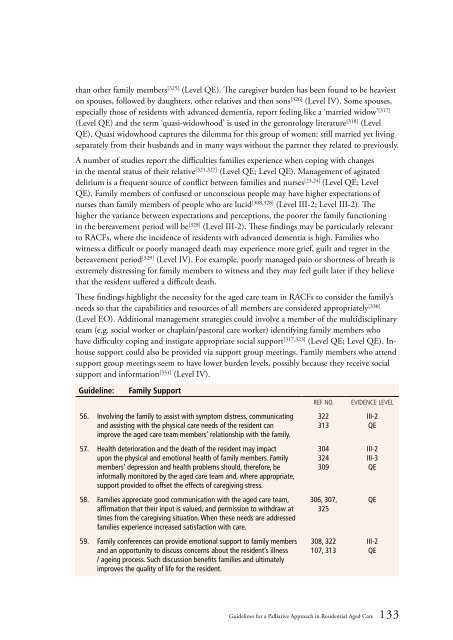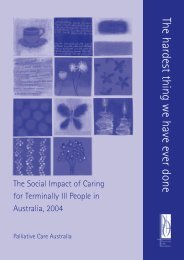Guidelines for a Palliative Approach in Residential Aged Care
Guidelines for a Palliative Approach in Residential Aged Care
Guidelines for a Palliative Approach in Residential Aged Care
You also want an ePaper? Increase the reach of your titles
YUMPU automatically turns print PDFs into web optimized ePapers that Google loves.
than other family members [325] (Level QE). The caregiver burden has been found to be heaviest<br />
on spouses, followed by daughters, other relatives and then sons [326] (Level IV). Some spouses,<br />
especially those of residents with advanced dementia, report feel<strong>in</strong>g like a ‘married widow’ [317]<br />
(Level QE) and the term ‘quasi-widowhood’ is used <strong>in</strong> the gerontology literature [318] (Level<br />
QE). Quasi widowhood captures the dilemma <strong>for</strong> this group of women: still married yet liv<strong>in</strong>g<br />
separately from their husbands and <strong>in</strong> many ways without the partner they related to previously.<br />
A number of studies report the difficulties families experience when cop<strong>in</strong>g with changes<br />
<strong>in</strong> the mental status of their relative [321,327] (Level QE; Level QE). Management of agitated<br />
delirium is a frequent source of conflict between families and nurses [23,24] (Level QE; Level<br />
QE). Family members of confused or unconscious people may have higher expectations of<br />
nurses than family members of people who are lucid [308,328] (Level III-2; Level III-2). The<br />
higher the variance between expectations and perceptions, the poorer the family function<strong>in</strong>g<br />
<strong>in</strong> the bereavement period will be [328] (Level III-2). These f<strong>in</strong>d<strong>in</strong>gs may be particularly relevant<br />
to RACFs, where the <strong>in</strong>cidence of residents with advanced dementia is high. Families who<br />
witness a difficult or poorly managed death may experience more grief, guilt and regret <strong>in</strong> the<br />
bereavement period [329] (Level IV). For example, poorly managed pa<strong>in</strong> or shortness of breath is<br />
extremely distress<strong>in</strong>g <strong>for</strong> family members to witness and they may feel guilt later if they believe<br />
that the resident suffered a difficult death.<br />
These f<strong>in</strong>d<strong>in</strong>gs highlight the necessity <strong>for</strong> the aged care team <strong>in</strong> RACFs to consider the family’s<br />
needs so that the capabilities and resources of all members are considered appropriately [330]<br />
(Level EO). Additional management strategies could <strong>in</strong>volve a member of the multidiscipl<strong>in</strong>ary<br />
team (e.g. social worker or chapla<strong>in</strong>/pastoral care worker) identify<strong>in</strong>g family members who<br />
have difficulty cop<strong>in</strong>g and <strong>in</strong>stigate appropriate social support [317,323] (Level QE; Level QE). Inhouse<br />
support could also be provided via support group meet<strong>in</strong>gs. Family members who attend<br />
support group meet<strong>in</strong>gs seem to have lower burden levels, possibly because they receive social<br />
support and <strong>in</strong><strong>for</strong>mation [331] (Level IV).<br />
Guidel<strong>in</strong>e:<br />
Family Support<br />
56. Involv<strong>in</strong>g the family to assist with symptom distress, communicat<strong>in</strong>g<br />
and assist<strong>in</strong>g with the physical care needs of the resident can<br />
improve the aged care team members’ relationship with the family.<br />
57. Health deterioration and the death of the resident may impact<br />
upon the physical and emotional health of family members. Family<br />
members’ depression and health problems should, there<strong>for</strong>e, be<br />
<strong>in</strong><strong>for</strong>mally monitored by the aged care team and, where appropriate,<br />
support provided to offset the effects of caregiv<strong>in</strong>g stress.<br />
58. Families appreciate good communication with the aged care team,<br />
affirmation that their <strong>in</strong>put is valued, and permission to withdraw at<br />
times from the caregiv<strong>in</strong>g situation. When these needs are addressed<br />
families experience <strong>in</strong>creased satisfaction with care.<br />
59. Family conferences can provide emotional support to family members<br />
and an opportunity to discuss concerns about the resident’s illness<br />
/ age<strong>in</strong>g process. Such discussion benefits families and ultimately<br />
improves the quality of life <strong>for</strong> the resident.<br />
Ref No.<br />
322<br />
313<br />
304<br />
324<br />
309<br />
306, 307,<br />
325<br />
308, 322<br />
107, 313<br />
Evidence level<br />
III-2<br />
QE<br />
III-2<br />
III-3<br />
QE<br />
QE<br />
III-2<br />
QE<br />
<strong>Guidel<strong>in</strong>es</strong> <strong>for</strong> a <strong>Palliative</strong> <strong>Approach</strong> <strong>in</strong> <strong>Residential</strong> <strong>Aged</strong> <strong>Care</strong> 133
















